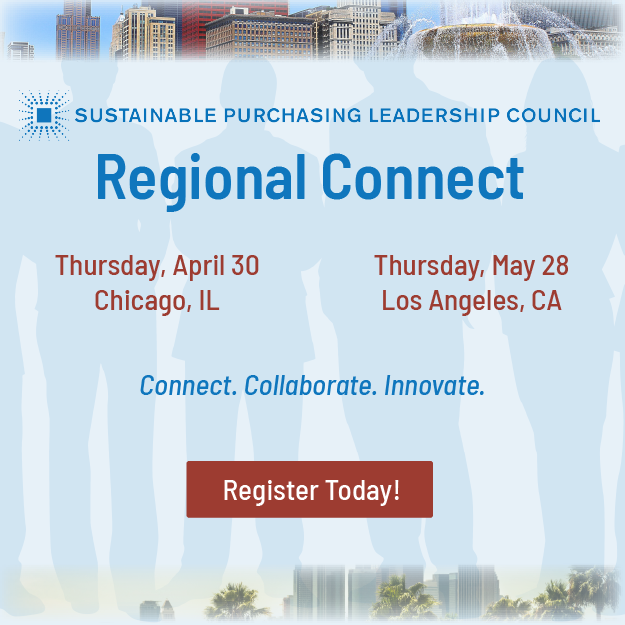SPLC Unveils the 2025 Leadership Award Honorees
FOR IMMEDIATE RELEASE
November 19, 2025 – The Sustainable Purchasing Leadership Council (SPLC) is proud to announce the recipients of its esteemed 2025 Leadership Awards.
The annual SPLC Leadership Awards celebrate the organizations and individuals who stand out for their exceptional leadership and pioneering spirit in implementing sustainable procurement practices. Their efforts are crucial in driving significant positive environmental, social, and economic impacts across their operations and supply chains.
The distinguished honorees of the 2025 SPLC Leadership Awards are:
OVERALL PROGRAM
Sustainable Procurement at University of Western Ontario
University of Western Ontario
Western University’s Sustainable Procurement Program was launched to embed environmental, social, and ethical responsibility into every purchasing decision, aligning with the institution’s Environmental, Social, and Governance (ESG) commitments. The program provides a framework for sustainable sourcing, supplier engagement, and risk management, positioning Western as a leader in higher education procurement practices. The program has already achieved significant successes. Aligning with Canada’s Supply Chains Act, Western introduced a Supplier Code of Conduct alongside providing training to staff and faculty on the risks of modern slavery in supply chains. Sourcing processes now include mandatory sustainability evaluations. To reduce its environmental footprint, the University transitioned to Sugar Sheet paper and continues to deliver end-user training and practical resources to support informed, sustainable purchasing. Supplier engagement activities further strengthen collaboration and accountability, ensuring sustainability is integrated at every stage of procurement. Together, these initiatives advance Western’s commitment to environmental responsibility, social equity, and ethical supply chains, while establishing a model for other institutions to follow.
SUPPLIER ENGAGEMENT
Economic Prosperity, Equity, and Sustainability through Procurement Policies
County of San Diego
The County of San Diego (County) is committed to building a more inclusive and resilient regional economy, especially through supporting the prosperity of small businesses, nonprofits, and community-based organizations. This is achieved through a variety of programs and services, and by leveraging more than $2 billion in annual purchasing power. In April 2024, the County initiated a year-long exploration to enhance local business participation in County procurements and simplify procurement procedures, which will reduce negative ecological impacts and increase opportunities for small, minority-owned, women-owned, veteran-owned, and LGBTQ+-owned businesses as well as Social Equity Enterprises. The County implemented a phased engagement strategy that reached nearly 400 organizations and involved more than 1,500 touchpoints overall with County staff across departments. Input gathered from these business owners, nonprofits, and community leaders informed a suite of policy and program updates that were approved by the San Diego County Board of Supervisors in August 2025 (effective September 2025). This multifaceted approach strengthened the County’s role in supporting local economic development, promoting sustainability, and increasing equity and access in county procurement and contracting.
SPECIAL INITIATIVE
The Benefits of Green Steel Procurement in Solar
NEXTPOWER (formerly Nextracker)
NEXTPOWER is leading the solar industry’s transition toward low-carbon manufacturing through its proactive approach to green steel procurement. Recognizing that steel is a major contributor to its Scope 3 emissions, NEXTPOWER has taken strategic steps to reduce the carbon footprint embedded in its supply chain. This includes prioritizing steel sourced from Electric Arc Furnace (EAF) processes, which rely on recycled materials, resulting in significantly lower emissions compared to traditional blast furnace methods. NEXTPOWER in collaboration with leading decarbonization partners across the steel industry, has launched the Low Carbon Tracker, the industry’s first solar tracker solution designed with a reduced carbon footprint. By staying ahead of regulatory and market expectations, NEXTPOWER is not only driving its own sustainability goals but also enabling its customers to meet theirs. This case demonstrates how supply chain collaboration and early adoption of emerging low-carbon technologies can create scalable climate impact.
BUSINESS CASE
The Marketing Benefits of Sustainable Procurement
Canada Post Corporation
There are at least 18 competitors in the to-the-door parcel delivery sector in Canada. Canada Post has the best sustainability credentials, and has started to use sustainability as a branding differentiator. Canada Post is the only Canadian parcel company with a Gold rating from EcoVadis; the only Canadian parcel company to have joined the UN Global Compact; the only Canadian parcel company with a comprehensive Indigenous reconciliation and Indigenous engagement plan; the only Canadian parcel company in Brandfinance’s Best 100 Brands in Canada; the only Canadian parcel company with an ‘A’ rating for supplier engagement from Carbon Disclosure Project (CDP); the only Canadian parcel company in Canada’s Clean 16 and Clean 50; the only Canadian parcel company 100% owned by Canadians through the Government of Canada. Canada Post receives no government subsidy, and contributes $600M annually to federal, provincial, municipal and band governments.
PUBLIC INTEREST ADVOCATE
Harmonizing Travel Procurement: Embedding Sustainability into a $1.57 Trillion Industry
GBTA Foundation
The GBTA Sustainable Procurement Standards is a consolidated bank of sustainability questions for travel procurement that aligns with international sustainability standards. It enables corporate travel buyers to assess the sustainability efforts of suppliers (including airlines, hotels, and car rental companies) in a consistent and harmonized manner.
Companies spend US $1.57 trillion globally on business travel every year. According to the GBTA Sustainability Acceleration Challenge, one third of companies are currently choosing travel suppliers based on climate criteria, alongside other factors. Most of these companies are getting data on supplier sustainability through RFPs with custom or third-party developed questions. The Sustainable Procurement Standards are a globally-aligned set of questions developed by the industry, for the industry, having been vetted by more than 50 companies -- including buying organizations, travel suppliers, and standard setters such as the International Air Transport Association (IATA), Travalyst, and the World Sustainable Hospitality Alliance (WSHA).
As an open-source solution, the Sustainable Procurement Standards gives corporate travel buyers the tools to make procurement decisions, report in a way that aligns with current and anticipated legislations, and deliver on their sustainability objectives. The standards also ensure that suppliers are better prepared to respond to requests for information.
CIRCULAR ECONOMY
Optimizing Circular Logistics
FedEx Corporation
Each year, 50 million tons of electronic waste (e-waste) are generated worldwide1. To help address this issue, Pyxera Global collaborated with FedEx to design a circular logistics model. The goal was to understand how the logistics industry can better contribute to a more sustainable future by preventing e-waste.
In Phase I, Pyxera released a blueprint in July 2023 to guide the logistics industry in adopting circular practices. The report, Powering Sustainability through Circular Logistics2, emphasized the importance of and pathway ahead for the transition to a circular economy.
Phase II was the e-waste collection pilot with FedEx Supply Chain (FedEx), Pyxera Global (Pyxera), Electronic Recycling Solutions (ERS), The Electronics Reuse & Recycling Alliance (TERRA), and American Battery Technology Company (ABTC). From September 2023 to January 2024, individuals and businesses in the U.S. could send broken or unused laptops and tablets to an e-waste recycling center, free of charge via FedEx. Devices that could be repaired were refurbished, while those beyond repair were dismantled to salvage valuable materials like lithium-ion batteries.
Phase III published findings from the pilot and additional research, focusing on key aspects such as certifications, packaging, procedures, and the material volume necessary to ensure the success of a circular logistics program. These findings are part of a July 2024 report, Optimizing Circular Logistics: A Revisited Approach3.
Spotlight on Outstanding Case Study Awards
In addition to the main award winners, seven organizations have earned the Outstanding Case Study distinction. This recognition highlights organizations that have thoroughly documented successful and impactful sustainable purchasing initiatives, creating valuable blueprints for others to adopt. The winning case studies will be published in the SPLC’s Case Study Library. (See full list of Outstanding Case Study winners below.)
“The dedication and ingenuity showcased by this year's SPLC Leadership Award winners are truly motivating," stated Marc Heisterkamp, SPLC CEO. "These leaders are demonstrating the profound potential of sustainable procurement. They are not just reducing their environmental footprint and championing social equity; they are simultaneously spurring innovation and generating long-term value. Their unwavering commitment offers a compelling global model, proving that economic prosperity and planetary protection are mutually achievable goals.”
Awards Ceremony and Next Steps
The official SPLC Leadership Awards ceremony will take place virtually on Wednesday, December 3, at 2:00 pm EST. Attendees will join the celebration, hear directly from the award winners about their inspiring work, and explore their winning case studies in detail during interactive breakout sessions. Visit the SPLC Calendar of Events to secure your registration.
Outstanding Case Study Winners
Sustainable Mail Tubs: Circular Design and Indigenous Collaboration at Canada Post
Canada Post Corporation
CBSR and the Sustainable Procurement Fellowship
Canadian Business for Social Responsibility (CBSR)
Advancing Public Procurement Policy: Supplier Environmental Practices and Disclosures of Climate Information
Ceres / Massachusetts Operational Services Division
Strengthening Global Pharmaceutical Cold Chain in Low and Middle Income Countries
Direct Relief
Fairfax County Facilities Zero Waste Program
Fairfax County Government
A Circular Solution to Office Furniture Waste
Green Standards
Procuring a Better World
ProcureGoals
Media Contact
Kristy Pickurel, Director of Marketing & Communications, SPLC
kristyp@sustainablepurchasing.org
About SPLC
The Sustainable Purchasing Leadership Council (SPLC) is a global community of purchasers, suppliers, advocates, and experts dedicated to driving positive impact through the power of procurement. Visit SPLC at www.sustainablepurchasing.org.

